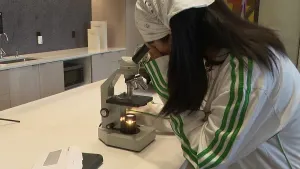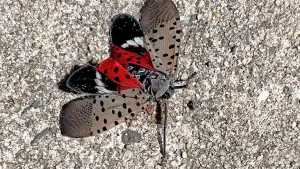More Stories
The New Jersey Department of Agriculture wants New Jersey residents to be on the lookout for the spotted lanternfly.
The invasive species is killing plants and spreading quickly through eight of New Jersey’s 21 counties. The Department of Agriculture received $500,000 last month in a last-minute budget add-on to combat the insects. Some legislators mocked the move. But the boost in funding will help the department fight back against an invasive pest that attacks more than 70 types of plants and could put the Garden State's agriculture industry at risk.
“It's a public menace, and everybody can play a part,” says Agriculture Secretary Douglas Fisher.
The department has issued a kill-on-sight order against the spotted lanternfly.
“Kill the insects first, and then give us a call later,” says Division of Plant Industry director Joseph Zoltowski.
Zoltowski says that the spotted lanternfly could destroy vineyards across New Jersey.
“If you're talking a vineyard and you have lots of feeding going on in the vineyard, they could kill off your rootstock. And once your root stock's gone, it takes a good five years to get that rootstock back up. So pretty much that vineyard's out of business,” he says.
Originally from Southeast Asia, the spotted lanternfly made its way to Pennsylvania, then New Jersey. Eight of the state's 21 counties are in a quarantine zone.
“Because they exponentially are increasing, each year we hear from communities around the state, 'I got them,’” Fisher says.
“It's almost like a forest fire, it started here and it's spreading out,” says Zoltowski.
The bugs can't fly until they reach adulthood in several weeks. Their feeding weakens plants. When they excrete, their sugary leavings attracts mold which smothers the tree, plant or vine to death.
“There is no predation going on, so there's no predators. And…until somebody does something, they just keep reproducing, reproducing, reproducing,” says Zoltowski. “Just squash it, I don't care what you do with it. Just destroy it.”
The extra dollars from the state will allow workers to spray more places to get rid of the bug. The federal money they were using before could be used to spray the bugs only if they were on one plant, an invasive plant species known as the Tree of Heaven.
RELATED LINKS
More from News 12
2:07

Have you seen a spotted lanternfly? Here’s what to know about the risk and what to do if you see one.
2:15

Squished! Jersey City middle school student discovers way to battle spotted lanternfly invasion

See it? Squish it! Fighting the invasive spotted lanternfly
2:44

‘It’s a very invasive insect.’ Vineyard and apple orchard owners fear spotted lanternfly infestation
2:25

Thousands of spotted lanternflies seen Tuesday at the Jersey Shore
0:19
